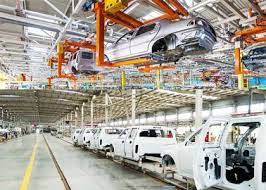The government lifted the ban on the import of used cars in Pakistan in early 2023 which has now triggered a new debate in the country just ahead of the upcoming budget for 2024-25 as how the looming balance of payment crisis will be erupted in the wake of increased import bill.
In the aftermath of the decision to lift the ban on the import of used cars, the major auto manufacturers were forced to reduce their production due to low demand. The low demand owing to a variety of factors including low demand witnessed shutting down of plants for 58 days, 78 days, and 89 days between October 2022 and August 2023 by three major manufacturers operating in the country.
On the other hand, imported used cars have gained a significant foothold, causing dent to the car manufacturers.For auto manufacturers, the calculation may be simple as they are doing business and they will continue to do it as long as they don’t suffer big losses and as they will surely always look for ways to maximize their profit.
A government should examine the worth of an industrial or business sector from the role it is playing in the social and political stability of the society. Pakistani governments seem to enjoy the epithet of being business friendly but that doesn’t reflect the true situation on the ground. They are rather more inclined towards facilitating the luxurious lifestyle of the upper middle classes or upper classes. Promoting industrial activity in society has never been a central objective of our governments. The economic history of fully developed economies of the Western world clearly shows that industry in these societies grew under the protective walls of high tariffs against imports and tax rebates to the local industry. This is a permanent theme of the industrial history of the United States, Western Europe, and Japan—the three most industrialized regions of the world whose governments now harp on the themes of free trade in international politics and trade.
In May, 2022 State Bank of Pakistan issued a circular imposing a restriction on Pakistani banks to seek prior approval of the State Bank before proceeding with dollar payment against any import of CKD (completely knocked down) units of cars that are being manufactured in Pakistan. This meant that Auto manufacturers would now need the permission of the State Bank of Pakistan as to what type and model of vehicle they will be manufacturing in their industry. Most Pakistani auto manufacturers and associated vendor industries are producing 65 to 71 percent of the parts used in the manufacturing processes locally. But still, they have to import around 40 percent of the parts from the country in which their brand of cars originates. Right now, the SBP is trying to micromanage the auto manufacturing industry.
They are telling Suzuki how many Swift CKDs they can import and how many Cultus CKDs they can import while telling Toyota how many Yaris and Corolla CKDs they can individually import. The crux of it is this – the government is trying to fight the current account deficit and in doing so has sought to curtail the imports of cars into the country through the SBP. The SBP will now decide on a case-to-case basis how many and which components needed to make a car are
imported. This will do no good to government exchequers but will surely hurt the industrial production process in Pakistani society, especially the auto industry. Eminent Pakistani experts have severely criticized this move of the government as in their opinion foreign exchange reserves could be recouped with the help of duties that are imposed on the import of CKD and increased duties would have been a better policy than imposing import restriction on the industry.
